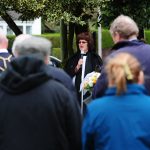Workers’ Memorial Day
Tomorrow, 28th April, is Workers’ Memorial Day. This is an international event remembering those who’ve died at work, or as a result of their work, and renewing our pledge to fight for safety at work for all.
This kind of commemoration usually passes most of us by – unless there’s been a recent workplace disaster in the news, or unless we know someone who died as a result of their work. But this year, when we’re experiencing a global coronavirus pandemic, International Workers’ Memorial Day takes on a whole new sense of importance. Although there’s a specific focus each year, the headline slogan of the commemoration has possibly never been so crucial as it is today:
Remember the dead, Fight for the living
This year we’re all living in unique circumstances. Lots of people are working in unique and sometimes extreme circumstances. Many have lost jobs and are struggling. Some of those working from home aren’t working in sensible environments. Others are working their socks off, with overlong hours to provide food and essential supplies, and to keep public services going. And, of course, thousands of key staff are working on the so called front-line, especially those working in health and social care and related roles. They are often putting themselves at much higher risk than anyone would normally expect as they treat those who succumb to the virus. Many of these groups are experiencing trauma on a scale never seen before, raising the need for increased mental health service provision in the future.
The risks faced by those working in the health and social care sectors is often acknowledged, but there are also others whose work and dedication often goes unrecognised – those working in childcare, the police, refuse collection, in hostels and rescue centres, in supermarkets and shops, in gas, water and electricity industries, and in transport services, to name just some of them.
Hundreds have lost their lives to the virus while working on the front-line. UK deaths so far where their work has contributed to their death include doctors, nurses, midwives, radiographers, healthcare assistants, paramedics, porters, bus drivers, train drivers, and prison officers. Many more might suspect that they caught the virus at work but they or their families will never know for certain.
We’ve become very good at clapping on Thursday evenings for the NHS and for carers. Workers’ Memorial Day is about paying tribute to workers who’ve lost their lives and put themselves in harm’s way to keep us safe and vital services running? Public events can’t be held this year but the organisers of Workers’ Memorial Day ask that everyone stands and keeps silence for 1minute at 11am on Tuesday. Will you?




Images are from previous Workers’ Memorial Day services in North East Lincolnshire
